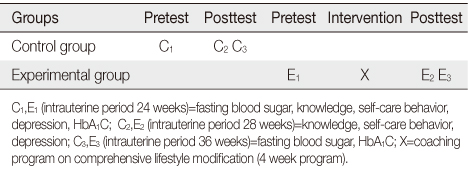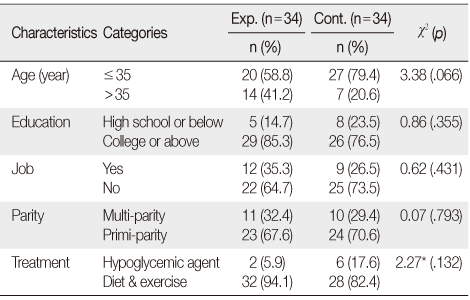Articles
- Page Path
- HOME > J Korean Acad Nurs > Volume 44(6); 2014 > Article
-
Original Article
- Effects of a Coaching Program on Comprehensive Lifestyle Modification for Women with Gestational Diabetes Mellitus
- Jung Mi Ko, Jong Kyung Lee
-
Journal of Korean Academy of Nursing 2014;44(6):672-681.
DOI: https://doi.org/10.4040/jkan.2014.44.6.672
Published online: December 31, 2014
1Department of Nursing, Cheongju University, Cheongju, Korea.
2Department of Nursing, Dankook University, Cheonan, Korea.
- Address reprint requests to: Lee, Jong Kyung. Department of Nursing, Dankook University, 119 Dandae-ro, Cheonan 330-714, Korea. Tel: +82-41-550-3883, Fax: +82-41-550-3888, kyunglee@dankook.ac.kr
© 2014 Korean Society of Nursing Science
This is an Open Access article distributed under the terms of the Creative Commons Attribution NoDerivs License. (http://creativecommons.org/licenses/by-nd/4.0/) If the original work is properly cited and retained without any modification or reproduction, it can be used and re-distributed in any format and medium.
Figure & Data
REFERENCES
Citations

- Lifestyle Interventions for Treatment and Remission of Type 2 Diabetes and Prediabetes in Adults: A Clinical Practice Guideline From the American College of Lifestyle Medicine
Richard M. Rosenfeld, Meagan L. Grega, Micaela C. Karlsen, Abd Moain Abu Dabrh, R. Nisha Aurora, Jonathan P. Bonnet, Lori Donnell, Stephanie L. Fitzpatrick, Beth Frates, Elizabeth A. Joy, Jane F. Kapustin, Dawn R. Noe, Gunadhar Panigrahi, Arun Ram, Lianna
American Journal of Lifestyle Medicine.2025;[Epub] CrossRef - Effects of a health coaching program based on Cox’s interaction model in older adults with diabetes mellitus in Korea: a quasi-experimental study
Hye Seung Kang
Journal of Korean Biological Nursing Science.2025; 27(4): 607. CrossRef - Development and Adaptability of Smartphone-based Dietary Coaching Program for Patients Undergoing Diabetes and Prediabetes with Continuous Glucose Monitoring Device
Myoung Soo Kim, Jung Mi Ryu, Minkyeong Kang, Jiwon Park, Yeh Chan Ahn, Yang Seok Kim
Journal of Health Informatics and Statistics.2023; 48(1): 36. CrossRef - Prepregnancy Glucose Levels Within Normal Range and Its Impact on Obstetric Complications in Subsequent Pregnancy: A Population Cohort Study
Ho Yeon Kim, Ki Hoon Ahn, Geum Joon Cho, Soon-Cheol Hong, Min-Jeong Oh, Hai-Joong Kim
Journal of Korean Medical Science.2023;[Epub] CrossRef - Gestational Diabetes Self-Care Behavior
Sahar Mansour Lamadah, Heba Abdel-Fatah Ibrahim, Wafaa Taha Elgzar, Hanan Abdelwahab El-Sayed, Samiha Hamdi Sayed, Amira El-Houfey
Iranian Journal of Nursing and Midwifery Research.2022; 27(6): 538. CrossRef - The effect of health-promoting lifestyle education program provided to women with gestational diabetes mellitus on maternal and neonatal health: a randomized controlled trial
Asli Ural, Nezihe Kizilkaya Beji
Psychology, Health & Medicine.2021; 26(6): 657. CrossRef - Comparing the effect of individual counseling with counseling on social application on self-care and quality of life of women with gestational diabetes
Fatemeh Ghasemi, Katayon Vakilian, Zohre Khalajinia
Primary Care Diabetes.2021; 15(5): 842. CrossRef - Effects of nonpharmacological interventions on the psychological health of high-risk pregnant women: a systematic review and meta-analysis
Hyeji Yoo, Sukhee Ahn
Korean Journal of Women Health Nursing.2021; 27(3): 180. CrossRef - Breastfeeding experiences of women with gestational diabetes
Seungmi Park, Soo-Young Yu
The Journal of Korean Academic Society of Nursing Education.2021; 27(3): 274. CrossRef - The Effects of Snack Control Education and Telephone Coaching on Self-Management, Social Support, Self-Efficacy, and Blood Glucose in Diabetes Patients
Hye Eun Park
The Journal of Korean Diabetes.2021; 22(4): 274. CrossRef - Psychosocial support interventions for women with gestational diabetes mellitus: a systematic review
Seulgi Jung, Yoojin Kim, Jeongok Park, Miyoung Choi, Sue Kim
Korean Journal of Women Health Nursing.2021; 27(2): 75. CrossRef - The effects of health care programs for gestational diabetes mellitus in South Korea: a systematic review
Seo Jin Park, Jina Lee
Korean Journal of Women Health Nursing.2020; 26(4): 274. CrossRef - The effectiveness of group hope therapy on the mental health of type II diabetic patients referred to the diabetes clinic in South East Iran
Batool Pouraboli, Tayebeh Ilaghi, Abazari Faroukh, Majid Kazemi
International Journal of Adolescent Medicine and Health.2020;[Epub] CrossRef - The effect of self care counseling on health practices of 35 years or more aged pregnant women referring to Hamadan health care centers, in 2018
Soodabeh Aghababaei, Fereshteh Omidifard, Ghodratollah Roshanaei, Parisa Parsa
Avicenna Journal of Nursing and Midwifery Care.2020; 28(1): 67. CrossRef - Effects of a Web-Based Self-Management Program on the Behavior and Blood Glucose Levels of Women with Gestational Diabetes Mellitus
Yun-Su Kim, Hee-Seung Kim, Yoo-Lee Kim
Telemedicine and e-Health.2019; 25(5): 407. CrossRef - Effects of a Postnatal Care Program on Self-efficacy, Self-management, and Glycemic Control in Women with Gestational Diabetes Mellitus
Yeong Kyung Jeon, Hyo Jin Kim, Mi Yeon Yang, Da Yeong Jung, Kum Young Yoon, Gie Ok Noh
Korean Journal of Women Health Nursing.2018; 24(4): 367. CrossRef - Knowledge and health beliefs about gestational diabetes and healthy pregnancy's breastfeeding intention
Seungmi Park, Jung Lim Lee, Jang In Sun, Youngji Kim
Journal of Clinical Nursing.2018; 27(21-22): 4058. CrossRef - Needs for Development of IT-based Nutritional Management Program for Women with Gestational Diabetes Mellitus
Chan-Jung Han, Sun-Young Lim, Eunsuk Oh, Yoon-Hee Choi, Kun-Ho Yoon, Jin-Hee Lee
Korean Journal of Community Nutrition.2017; 22(3): 207. CrossRef - Effects of a Group Coaching Program on Depression, Anxiety and Hope in Women with Breast Cancer Undergoing Chemotherapy
So Ryoung Seong, Moon-kyung Cho, Jeeyoon Kim, Yeo Ok Kim
Asian Oncology Nursing.2017; 17(3): 188. CrossRef - A Review on the Use of Effect Size in Nursing Research
Hyuncheol Kang, Kyupil Yeon, Sang-Tae Han
Journal of Korean Academy of Nursing.2015; 45(5): 641. CrossRef

Figure 1
Homogeneity Test of General Characteristics between the Experimental and Control Groups (N=68)
*Fisher's exact test; Exp.=Experimental group; Cont.=Control group.
Homogeneity Test of Dependent Variables between the Experimental and Control Groups (N=68)
Exp.=Experimental group; Cont.=Control group; FBS=Fasting blood sugar; HbA1C=Glycosylated hemoglobin.
Differences in Dependent Variables between Experimental and Control Groups (N=68)
*F value of ANCOVA with pre-test value as covariate; Exp.=Experimental group; Cont.=Control group; FBS=Fasting blood sugar; HbA1C=Glycosylated hemoglobin.
*Fisher's exact test; Exp.=Experimental group; Cont.=Control group.
Exp.=Experimental group; Cont.=Control group; FBS=Fasting blood sugar; HbA1C=Glycosylated hemoglobin.
*F value of ANCOVA with pre-test value as covariate; Exp.=Experimental group; Cont.=Control group; FBS=Fasting blood sugar; HbA1C=Glycosylated hemoglobin.
 KSNS
KSNS
 E-SUBMISSION
E-SUBMISSION




 Cite
Cite

